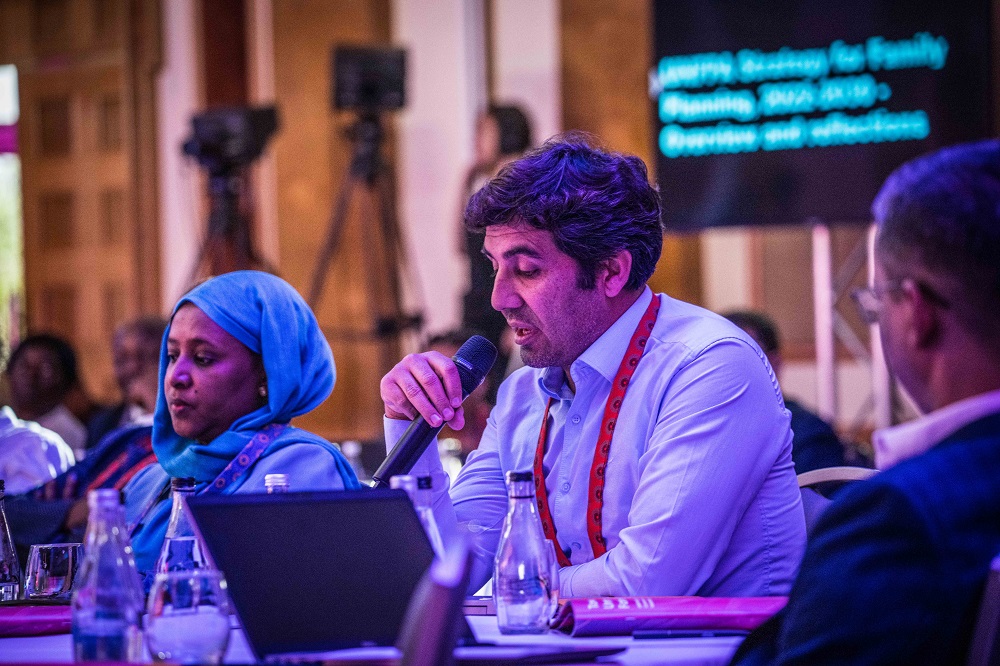JOHANNESBURG, South Africa, 19 December 2022—In a race against time to achieve a world where every pregnancy is wanted, UNFPA, the United Nations sexual and reproductive health agency, has set out how its visionary global family planning strategy will be put into action.
The new strategy, Expanding Choices – Ensuring Rights in a Diverse and Changing World, defines how UNFPA will accelerate family planning efforts in addressing barriers to bodily autonomy, maternal health, issues of infertility, engagement of men and boys in sexual and reproductive health, and women’s empowerment to exercise individual choice about whether, when and how often to become pregnant.
Rapid population growth, conflict, migration, urbanization, environmental degradation, and declining fertility are reshaping entire communities and societies.
UNFPA technical and managerial staff from 23 countries in East and Southern Africa and from across UNFPA’s five other regions and headquarters came together to interpret what the shifts in the organizational approach to family planning will mean in their different country contexts. New ways of working and opportunities for UNFPA to lead and to engage partners to drive progress were deliberated. Participants called for addressing frontier issues, making stronger use of data and evidence, and greater capacity to identify and scale proven interventions for impact.

Gifty Addico, who heads the family planning and commodity team of UNFPA, said that the strategy fits diverse situations and settings. She added, “It embraces a broader, more inclusive conceptualization of family planning and places even greater emphasis on gender equality and human rights.”
Power of Family Planning within an integrated approach
Family planning is the foundation of sexual and reproductive health and rights, with multiplier effects that ripple across education, skills and work, gender equality, health, and more. For all individuals, whether they want to plan their family or simply protect their reproductive health, access to family planning is critical to their ability to fulfill their aspirations and potential. This is the transformational power of family planning.
Increasingly, countries are investing in universal health coverage that integrates family planning, enacting laws and policies that uphold human rights, and reduce barriers to access. They recognize that voluntary rights-based family planning offers tremendous, short- and long-term returns on investment.
In a 2022 analysis, UNFPA estimates that for every dollar invested in family planning and maternal health in developing countries, the return on investment to families and societies is US$ 8.40. From 2022 to 2030, it is estimated that these countries will need to spend an additional US$ 79 billion to end unmet need for family planning and preventable maternal deaths. If these additional investments are made, it would generate US$ 660 billion in economic benefits by 2050.
In her remarks, Chinwe Ogbonna, Deputy Regional Director of UNFPA East and Southern Africa, said, “This is an opportunity to go beyond business as usual and use data and evidence and what works from differentiated country and regional experiences, to ensure we embrace agile, innovative approaches to support rapid scale-up of high impact practices, while ensuring we leave no one behind, especially the most marginalized girls and young women.”
For more information
Daisy Diamante Leoncio
UNFPA East and Southern Africa Regional Communications Adviser
leoncio@unfpa.org
About UNFPA:
UNFPA is the United Nations sexual and reproductive health agency. UNFPA's mission is to deliver a world where every pregnancy is wanted, every childbirth is safe and every young person's potential is fulfilled. UNFPA calls for the realization of reproductive rights for all and supports access to a wide range of sexual and reproductive health services, including voluntary family planning, quality maternal health care and comprehensive sexuality education.
More photos:







